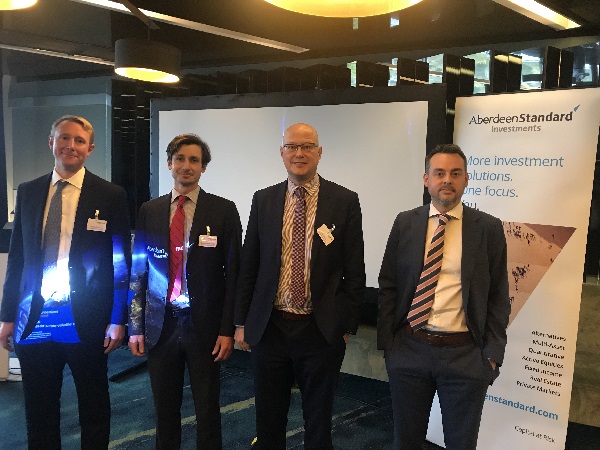 L-R: William Martinez; Maximilien Macmillan; Mike Brooks; Jeremy Lawson;
L-R: William Martinez; Maximilien Macmillan; Mike Brooks; Jeremy Lawson;
On Wednesday 6 November 2019, Aberdeen Standard Investments (ASI) held a lunchtime investment conference at the Sofitel Grand-Ducal in Luxembourg-Gare at which Jeremy Lawson, ASI's Chief Economist, presented his outlook for 2020 including macro economic views.
With current geopolitical risks, the trade dispute between the United States and China, fears of recession and a constantly changing investment climate, investors have a lot to digest today. That will probably not be any different in 2020...
Jeremy Lawson started by explaining that people should not confuse symptoms with causes, e.g. trade wars and ECB policies are the former, not the latter. He asked if the global economy is heading for recession, explaining that the Eurozone economy has slowed down, but unevenly across sectors, with consumption in the services sector remaining strong - trade between the US and China is predominately through the industrial sector. He does not think that pre-conditions exist for a recession in the short term.
On monetary policy, in Europe it is low while in the US it is high. However, if the fiscal policy environment were to change significantly, this would affect monetary policy.
He addressed both labour force growth and labour productivity, both of which have fallen off in recent years, partly due to a slowdown in globalisation and a lack of new policy reform. With the rise in populism, he doubts that this will change anytime soon.
On longer-term investment opportunities, he stated that emerging markets and developing countries' share of global GDP doubled from 20% to 40% between 2000 and 2019, and could reach 50% by 2035. Addressing climate change, he said that massive transformations will be needed in energy across the power, industrial, transportation, real estate and farming sectors; however, the speed of adjustment is uncertain. And related to the 4th industrial revolution, productivity growth has slowed, yet AI innovation continues apace.
Maximilien Macmillan, fixed income investment manager, addressed asset allocations, explained that equity returns are highly dependent on cycles, with strong returns early and mid-cycle, with poor returns later in the cycle; as a result, he explained that they are extremely concerned about margins and valuations now nearing cycle peaks. He explained that they take a weighted approach regarding expected returns.
With the risk of recession currently modest, the ASI recession risk model predicts the US entering recession in 12 months' time. Also, normally recessions offer less protection and meagre returns. Given the starting point, he stated that the Fed will be unable to reduce interest rates by up to 5% as they did in 2008.
He talked about emerging market local currency debt being more appealing nowadays, promoting the buying of local currency bonds. On infrastructure equity and debt, he said that economically insensitive cash flows mean more correlation to equity. He stated that these are not cyclical at all and expressed that there is great value in this asset class.
He concluded by stating that ASI's outlook for asset class investment returns has changed significantly in the last 5 years which has resulted in substantial shifts in the composition of their strategic growth portfolios.
Mike Brooks, head of diversified multi-asset assets, addressed asset class allocations with reduced levels of volatility. He described ASI's approach as a rich opportunity set that can reduce reliance on equities (30% to 20%) and bonds.
He explained that ASI's current positioning reflects the challenging outlook for traditional asset classes, and also illustrated the evolving asset allocation to exploit the best opportunities (to position the portfolio in the next 5 years). He talked about renewables infrastructure offering a 7-9% return with a geographic spread, and asset-backed securities and music royalties (streaming, diverse catalogue) with niche investments offering 10-15% returns.
Overall, long-term performance is good from a diverse range of assets; he did, however, highlight downturns related to natural disasters, etc.
In conclusion, he stated that the outlook for traditional asset classes is challenging and there is now a much more diverse range of attractive asset classes available to investors.
William Martinez then talked about targeting a better risk reward than global equities and stated that diversification is indeed important, addressing multi-asset investment capabilities offering a range of advanced diversification approaches based on conventional exposures. He presented ASI's Enhanced Diversification Multi-Asset (ADMA) approach and portfolio, its drivers and tactical opportunities where sometimes risk / reward calculations can change quickly, focussing on a disciplined, efficient and repeatable framework in its investment process.
ASI in Luxembourg manages over €100 billion in assets.








